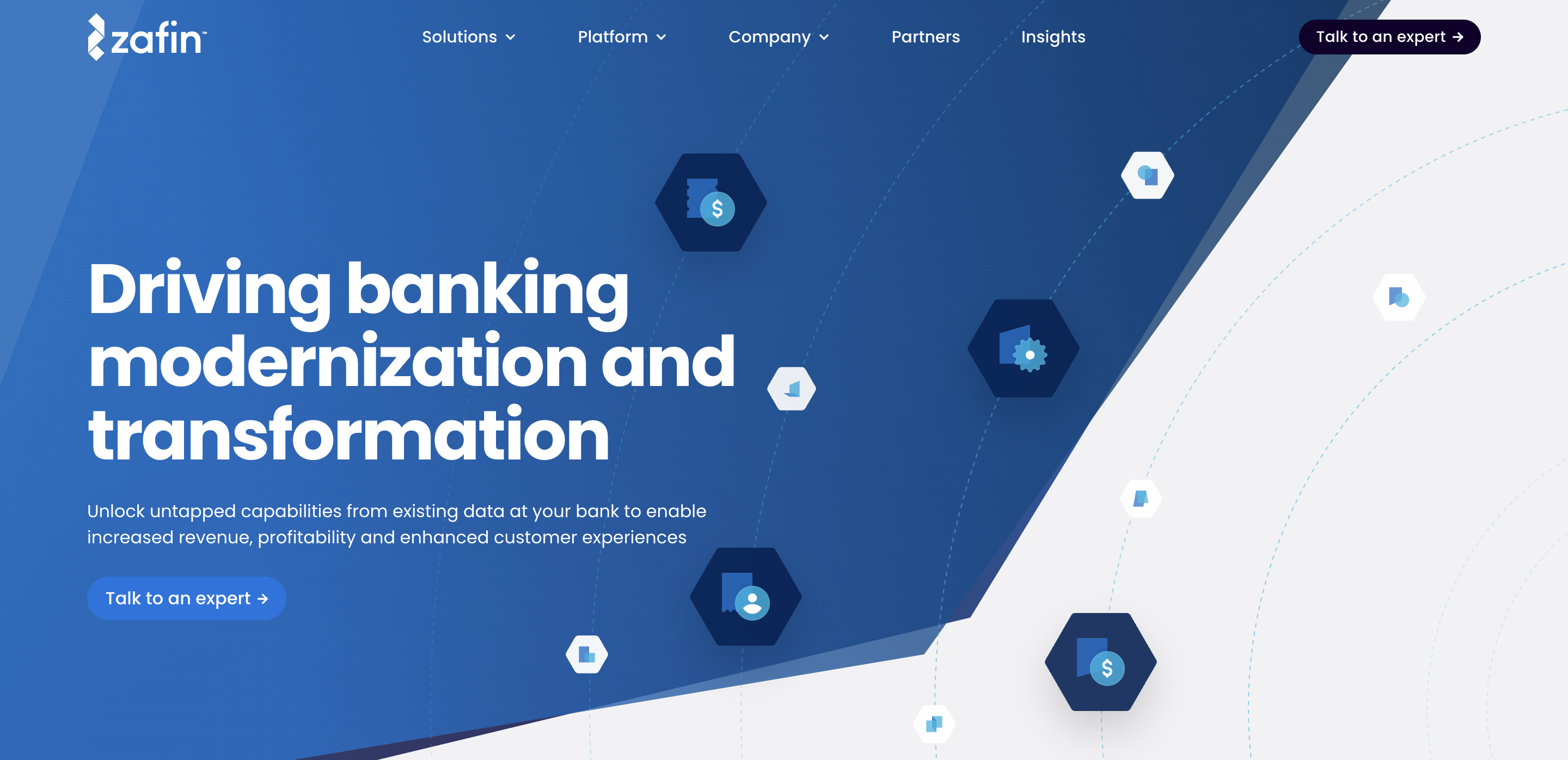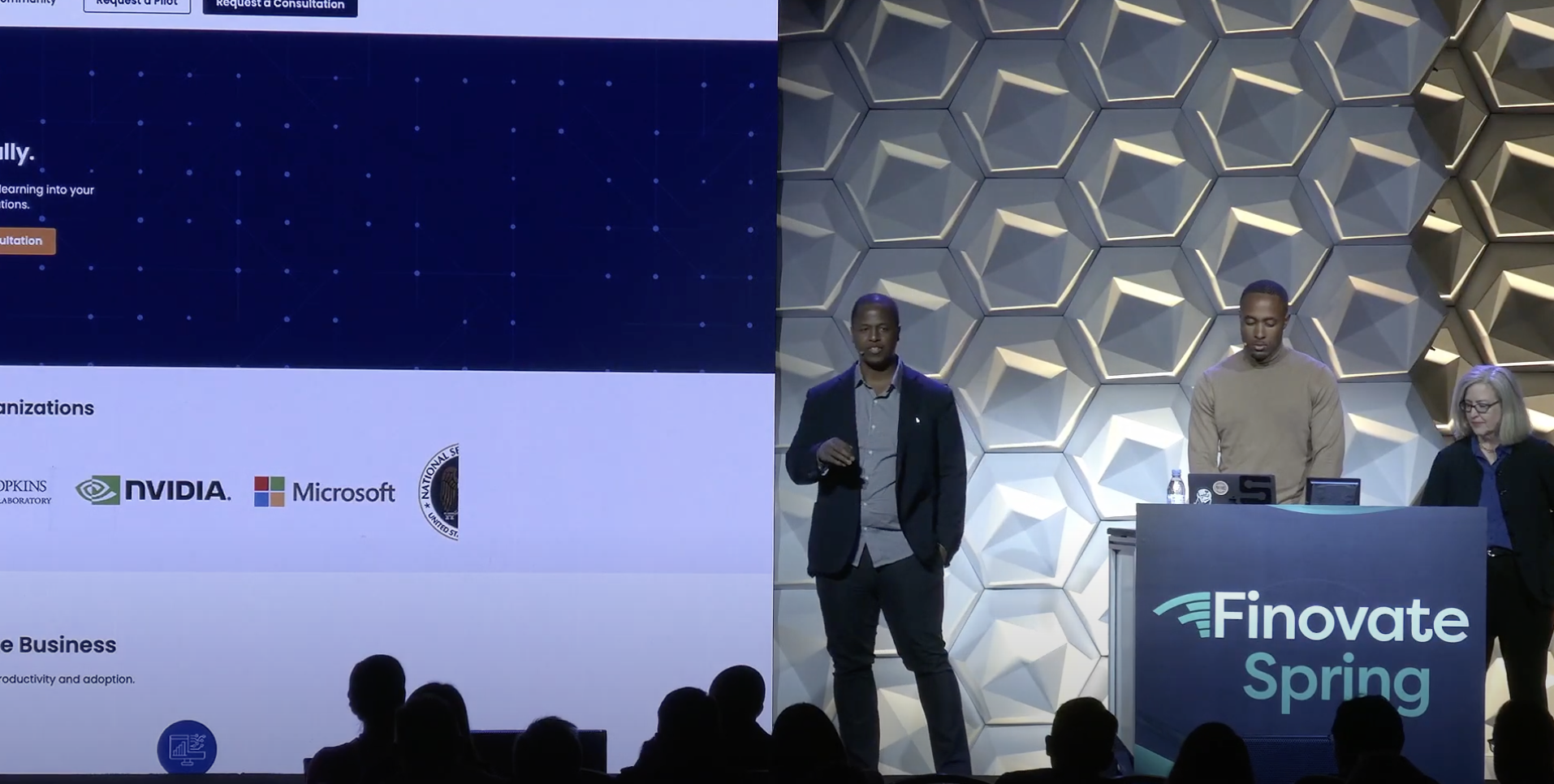
What are the biggest challenges facing banks when it comes to modernization and digital transformation? We checked in with Charbel Safadi, President, Modernization and Transformation, with Zafin, to hear his thoughts on what banks and other financial institutions are doing to future-proof their businesses and better serve their customers.

Zafin made its Finovate debut in 2017 at FinovateFall. The company offers a cloud-based product and pricing platform that simplifies core modernization for the world’s biggest banks. Zafin’s platform enables business teams to collaborate in the design and management of pricing, products, and packages. At the same time, the platform empowers technology teams to streamline core banking systems.
Headquartered in Vancouver, Canada, and founded in 2002, Zafin includes Wells Fargo, HSBC, and CIBC among its customers.
When you look at the current landscape for banks, what is their biggest technological challenge right now?
Charbel Safadi: The predominant technological challenge facing banks in the current landscape is the accumulation of legacy technology platforms that impede adaptability and innovation. These platforms, built over several decades, create a significant tech debt, hindering banks from promptly responding to changing market demands. This stands in contrast to agile fintech startups, unburdened by such legacy systems.
For banks, the challenge lies in modernizing these deeply entrenched platforms to enable transformative experiences and stay competitive in the rapidly evolving financial landscape. Despite significant time and financial investments, the traditional “rip and replace” approach has proven unsuccessful. This tech debt, rather than a lack of inherent competitiveness, is the primary obstacle for banks in delivering compelling value propositions, necessitating a forward-looking, progressive modernization strategy.
You just recently joined Zafin and are part of the company’s new transformation and modernization division. Tell us about why you joined the company and what this new division is all about.
Safadi: Zafin’s mission is to empower banks in reshaping their business models and updating technology platforms. As a leader in our organization, my role is to align our vision with clients’ business goals, fostering a cohesive team that mirrors banks’ transformation strategies. With a background in financial services consulting and experience with global banks, I recognize the market’s strong focus for the next decade and Zafin’s potential impact.
Being part of Zafin’s journey excites me, given its pivotal role in contributing to clients’ transformation agendas. Zafin’s strategic position emphasizes technology and business platforms, distinguishing it in the market. This allows us to provide significant value, aiding clients in kickstarting technology modernization while transforming their business models.
I am confident in our ability to guide clients through this journey, making a substantial impact and offering the necessary tools for success. Zafin’s forward-thinking strategy, coupled with our cohesive team and inclusive culture, solidified my decision to be part of this transformative organization.
Tell us about the launch of Zafin Studio. What challenge will it help Zafin customers resolve?
Safadi: Zafin Studio represents a significant advancement in the modernization of technology platforms, specifically addressing the challenge of crafting forward-looking propositions tailored to each client’s unique values and needs. Unlike existing solutions in the market, Zafin Studio adopts a comprehensive approach to banking propositions. Leveraging the Product and Pricing Index (PPI) tool, it rapidly gathers, filters, and segments data and insights for analysis from leading global banks, bridging a crucial market gap. This empowers various stakeholders within a bank, from business users to product managers and department heads.
Our goal is to equip them with the tools to comprehend market dynamics, enabling swift research on top banks worldwide and insights into their product designs and rate structures. The collected information is entirely external and does not involve customer data. Through Product Explorer, Zafin Studio unravels the intricacies of product offerings, merging external market research with an internal product explorer. The drag-and-drop feature of Proposition Canvas in turn empowers banks to seamlessly design and implement cutting-edge functionalities. Essentially, Zafin Studio acts as a governing methodology and framework, revolutionizing banks’ transformation approaches. We eagerly anticipate our clients utilizing Zafin Studio to elevate co-created value propositions to new heights.

Zafin is headquartered in Vancouver, Canada. What are some of the top concerns for Canadian banks that might differ from those of banks in the U.S., the U.K., or Europe?
Safadi: In Canada, the banking landscape differs significantly from the U.S., U.K. and Europe due to population size and the number of institutions. Canadian banks are primarily concerned with population dynamics, competition, and the regulatory framework. The evolving regulatory landscape indicates that open banking is on the horizon in Canada. This, combined with the rise of innovative fintech firms free from legacy technology constraints, compels banks to prepare for the coming years.
While fintech companies lack the technological burdens of traditional institutions, they also lack the established customer base of incumbents. To capitalize on this, banks must pivot towards a more horizontally aligned approach to product development and proposition modeling. This involves adopting a holistic view of the Canadian customer, encompassing their entire financial journey and value chain. By consolidating data from diverse systems, including mortgages, lending, and deposits, banks can craft compelling value propositions that genuinely resonate with consumers. Prioritizing strong relationships over sheer customer volume is crucial. This means tailoring pricing, offers, and incentives to match the customer’s entire banking journey. This forward-thinking approach ensures sustained delivery of substantial value and the preservation of loyalty within the existing client base, thereby upholding a competitive edge rooted in customer trust.
Speaking of international activity, Zafin recently announced a new operational center in Dubai and the upcoming release of various AI-based solutions for the Middle Eastern market. Tell us about some of the top trends in fintech in the Middle East?
Safadi: Zafin is making significant investments in Generative AI, with Zafin Copilot serving as a central component in our technology portfolio. This tool is pivotal for both external client interactions and internal team processes. We’ve dedicated significant efforts to explore how AI can enhance product and pricing modeling, effectively harnessing continuously generated data, including customer details, transactions, and relationship data. We’ve made it a priority to equip our clients with the technological capabilities needed for full access to the rich data set within our platform.
Globally, AI forms a fundamental part of our strategy, with a notable emphasis on the Middle Eastern marketplace. This region’s substantial investments in AI makes it an ideal ground to explore dynamic pricing, especially in comparison to markets with stricter pricing regulations.
Our core principles of trust, transparency, and fairness in banking guide all AI development initiatives. We ensure strict adherence to regulatory frameworks across global markets. AI is viewed as an intrinsic element of our entire platform, offering benefits to our customers, end consumers, and internal teams while aligning with our commitment to ethical and regulatory standards.
What trends in fintech and financial services are currently being underestimated in terms of their potential impact in the next few years?
Safadi: Many organizations are considering the adoption of Generative AI technologies. The central question revolves around how AI can effectively be utilized to reassess and improve product design, customizing offerings for each individual. This transition not only poses a challenge but also presents an opportunity. AI has the potential to centralize and grant access to the everyday data encountered by most organizations. The focus should now pivot towards creating dynamic product offerings that align with the unique value of each individual, taking into account the customer’s current life stage, priorities, and preferences.
In addition to well-explored areas like AI, another crucial emphasis lies in the design of the next-generation product architecture. Through global discussions and collaborations with banking clients, trailblazing organizations such as Zafin are actively shaping a horizontal model for the next generation of product architecture in financial institutions. This architecture should span the entire spectrum of banking, delivering a tailored and dynamic experience precisely meeting the customer’s needs at any given moment. Banks should persist in prioritizing depth and loyalty in customer relationships, recognizing their significance in the forthcoming years.
What can we expect from Zafin over the balance of 2023 and into 2024?
Safadi: Zafin is firmly dedicated to executing its strategy, aiming to provide substantial value to our clients. This dedication empowers them to not only modernize their technology platforms but also to transform their business models. Our intense focus revolves around delivering the essential technology, capabilities, and skills required for both these endeavors. Through robust partnerships within our deep ecosystem, our goal is to offer comprehensive customer modernization journeys.
We strive to spare our clients from spending excessive time — potentially three to four years or even longer — struggling to overhaul their technology landscape without having the capacity to contemplate new product architectures and business models. Everything we undertake is geared towards facilitating a low-risk approach to modernize their technology platforms, unlocking the potential to construct next-generation product architectures promptly.
Simultaneously, we remain committed to upholding trust, transparency, and fairness in how our clients deliver products and services to their client base.




















